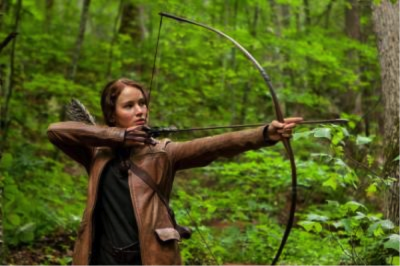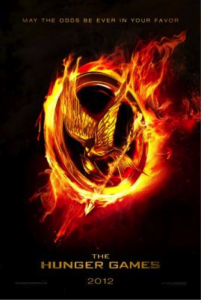By: debbie lynn elias
During the recent press junket for THE HUNGER GAMES, producer Nina Jacobson, an avid fan of THE HUNGER GAMES book trilogy talked about some of her concerns and considerations as a producer in bringing a beloved and intricately detailed story like THE HUNGER GAMES to the big screen.
Given that you are such a huge fan of the books, did you have input into or control over the look and design of the film?
Yes and no. Ultimately, I am very filmmaker oriented, as a producer. think the most important thing is that you have to really choose the players carefully. It was very important to me to choose a director like Gary [Ross], whose instincts come from character, who’s a storyteller, and who puts characters first. Visually, I felt that with each movie, Gary adopts a different style. He doesn’t have one look that’s “the Gary Ross look”, and I thought that was important. We needed somebody who would be character based and who would find the look of the movie. Also, the hiring of Phil Messina, the production designer, was a big decision. He’s so gifted, and his ideas were always so smart and rooted in American history and architecture. Nothing feels like it’s not us, or couldn’t be us, and I think that’s very important. But, in the evolution of the movie, Gary and I talked a lot about “tonal bandwidth” and making sure that the look and feel and style and choices of the movie stayed within a certain consistent bandwidth.
Can you elaborate on “tonal bandwidth”?
When you read a book, you create that tonal bandwidth. You set a tone for yourself, as you’re reading it, in which everything exists within the world of your imagination. In the book, it’s great when [Katniss] can push a button and food comes up, as per your order. But, we didn’t do that in the movie because we felt that it would be too fanciful and too Oz, and that the Capitol had to actually still be ominous. It had to be a mind-blower, but it had to be ominous. Another small decision was, that in the book, Haymitch throws up on Katniss’ shoes, but if you show that in a movie, suddenly the whole scene is about a person throwing up. There’s so much important character work that gets done in that scene, that we still wanted [Haymitch] to be a drunk, but also menacing and having some danger to him. So, you’re not doing the scene exactly the way it is in the book, but the intention of the scene is there.
Little decisions like that were made, every day. In this movie, we really focused on Cinna and we didn’t get time to focus on the other stylist. Part of it was staying inside Katniss’ head. I love those other stylists in the books, and I hope we can bring those characters more into focus, in the next movie. But, in this movie, we decided that we really needed to focus on Cinna and Katniss’ experience. We had to be in her shoes. She had to step into the Capitol, and it couldn’t be fun. In the books, you’re really in her head. She’s able to be frightened and intimidated, and you’re also able to have fun with the stylists. In the movie, we decided that we’d focus on the Cinna relationship, and keep grounded in her fear and anticipated, and we’ll explore the stylists in the next movie, if we’re lucky, once we’ve set the stage with this one.

A big concern had to be the MPAA and a potential rating for THE HUNGER GAMES given the amount of violence in the story and the concept of kids essentially killing kids. How did you go about deciding how to tackle the issue of violence and how graphic you should be within the film?
[T]hat was obviously a huge decision. When I first talked to Suzanne [Collins] about adapting the books, we knew a few things. We knew that we wanted it to be PG-13 because she wrote the book for readers 12 and up, and we wanted them to be able to see the movie. It’s a movie that is meant to be relevant to young people, and not exclude them in any way. On the other hand, we didn’t want to dilute or soften the material because that would really be irresponsible, in its own way. The books are very intense and very demanding of the reader, and the movie should be that too.
We both felt strongly that you wouldn’t want to age up the characters, no matter the age of the actors playing the roles. They should be playing the age that they are in the books. It would let people off the hook, if you said, “Well, instead of 12 to 18, why don’t you make them 18 to 25 or 16 to 21?” If you don’t stay true to the horror of the fact that they are 12 to 18, you’re not doing justice to the book.
So, we knew that we didn’t want to pussyfoot around the intensity of the subject matter, on the one had, but that we wanted to do it in a way that was also not exploitative or guilty of the crimes of the Capitol, in any way, shape or form. If the movie were stylized violence that was pretty and fun and cool, which is great when you go see 300 or The Matrix, it would just be out of sync with the fact that they’re kids. So, we felt that the violence had to feel real, it had to feel urgent, it had to feel like you were seeing it through Katniss’ eyes, and yet it couldn’t feel exploitative, sensationalistic, or like we were having fun because the subject matter has a gravitas that has to be honored.
Did the prospect of a sequel play a part in your decisions as a producer while making THE HUNGER GAMES?
Well, I’m very superstitious. . .I’ve always tried to really focus on this movie, knowing that, yes, these are amazing books and I would feel like a failure, if I didn’t get all three of them made. . . Certainly, the fans are there. They’ve grown enormously since the beginning. It’s been a crazy, snowballing thing while we’ve been making the movie. But, when we made the movie, we really just tried to keep our head down and make a movie that deserved a sequel. Ultimately, only audiences decide what’s a franchise. Only audiences decide what’s a hit. I have always been mindful of not wanting to be the Miami Heat of movies. Nobody roots for people who presume success. You have to earn success, and success is earned by making a movie that audiences like and want to see more of. There’s really no other way around it. I was an executive before I was a producer, and I’ve seen franchise fever grow, over the course of my career. The one thing that people always forget is that it’s only a franchise if audiences really want to see more of it. It’s up to them. It’s really not up to us. So, I was focused on this movie with my director, with the studio, and with the cast and crew. We all just focused on making the best possible movie we could, and earning the right to do more.

So often, the book author steps away from the film adaptation and takes a hands-off approach to the project. What was author Suzanne Collins’ involvement in bringing THE HUNGER GAMES to the big screen?
Suzanne was very involved in the development of the script. She wrote the first draft. She was very involved with Billy Ray, when he wrote his draft. And then, with Gary [Ross], they hit it off so well, when he was writing his draft, that they actually teamed up and wrote together, for his second draft. We had very involved conversations about the script, from the beginning through the start of production. She came and visited us during pre-production and saw some of the designs and where we were heading, and we talked to her a lot about casting. We wanted to make sure that she felt confident and comfortable with our casting choices. She was very supportive, but we very much wanted her blessing on casting. In production, she visited us once, but she really was not involved in the production process. Shefs seen the movie twice in the post-production process, once as an early cut and then once when it was finished.
This book adaptation-film franchise concept is a relatively new phenomenon for Hollywood. Do you think that because of Harry Potter and Twilight, that it‘s easier to now bring young adult stories to the big screen?
That’s a good question. I think part of it is that these books have genuinely crossed over. They’re really compelling books that have found an audience that has crossed over. The books make it possible, and the audience of the books make these opportunities possible, as well as the fact that people realize that they can have a communal experience with a book that wasn’t originally written for that broad of a community, but that has the appeal and the quality to actually extend to every age, and not just the age that it was originally written for.
THE HUNGER GAMES in theatres March 23, 2012. The world is watching.
#











